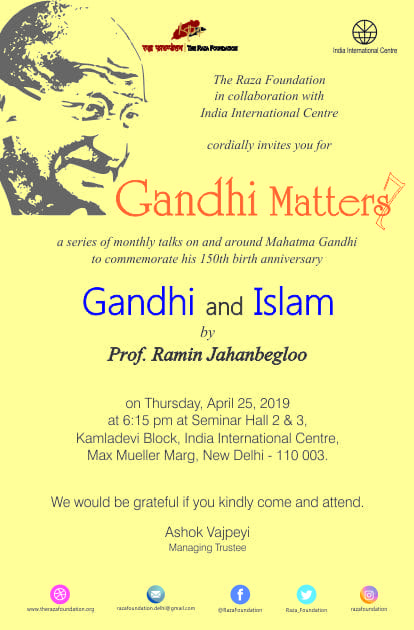
04-Apr-2019 12:00 AM
6378
Gandhi Matters is a series of monthly talks on Mahatma Gandhi to commemorate his 150th birth anniversary. These talks revolve around the philosophy of Mahatma Gandhi and its social and political relevance in contemporary times. The series began in October 2018, and will be wrapped up in October 2019. The Raza Foundation invites renowned social scientists, activists, and social workers to discuss on different themes in relation with Gandhian thought.
Amidst various issues ranging from deteriorating political scenario, environmental degradation, decline of social values, to different kinds of covert and overt violence witnessed around us, one can see formation of a vacuum in political thought to produce a profound solution for such issues or at least to pave the way towards their resolution. In such a scenario, Mahatma Gandhi emerges as a philosopher who not only, through his writings, compellingly professes his beliefs such as nonviolence (ahimsa), satyagraha, etc., but also allows us to rethink and re-evaluate his principles, and mould them to create variations in order to make them compatible with the present situation. The series ‘Gandhi Matters’ is one such initiative to revisit Gandhian thought.
Here, we publish the seventh discussion of Gandhi Matters by Ramin Jahanbegloo on ‘Gandhi and Islam’; the dialogue was moderated by Mr. Ashok Vajpeyi.
Ramin Jahanbegloo is a political philosopher. He is presently the Executive Director of the Mahatma Gandhi Centre for Nonviolence and Peace Studies and the Vice-Dean of the School of Law at Jindal Global University- Delhi, India.
He received his B.A. and M.A. in Philosophy, History and Political Science and later his Ph.D. in Philosophy from the Sorbonne University. In 1993 he taught at the Academy of Philosophy in Tehran. He has been a researcher at the French Institute for Iranian Studies and a fellow at the Center for Middle Eastern Studies at Harvard University. Ramin Jahanbegloo taught in the Department of Political Science at the University of Toronto from 1997-2001. He later served as the head of the Department of Contemporary Studies of the Cultural Research Centre in Tehran and, in 2006-07, was Rajni Kothari Professor of Democracy at the Centre for the Study of Developing Societies in New Delhi, India. In April 2006 Dr. Jahanbegloo was arrested in Tehran Airport charged with preparing a velvet revolution in Iran. He was placed in solitary confinement for four months and released on bail. He was an Associated Professor of Political Science and a Research Fellow in the Centre for Ethics at University of Toronto from 2008-2012 and an Associate Professor of Political Science at York University in Toronto from 2012 – 2015. He is also a member of the advisory board of PEN Canada. He is the winner of the Peace Prize from the United Nations Association in Spain (2009) for his extensive academic works in promoting dialogue between cultures and his advocacy for non-violence and more recently the winner of the Josep Palau i Fabre International Essay Prize.
The event was organised at India International Centre on 25th of April, 2019.